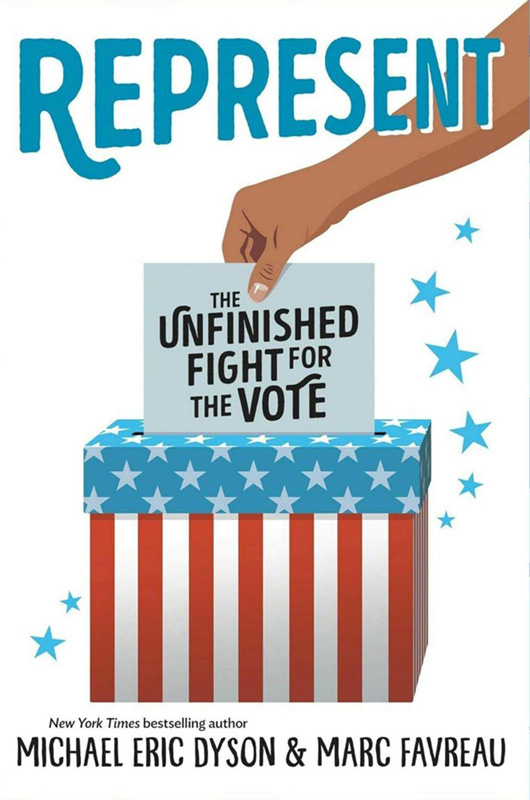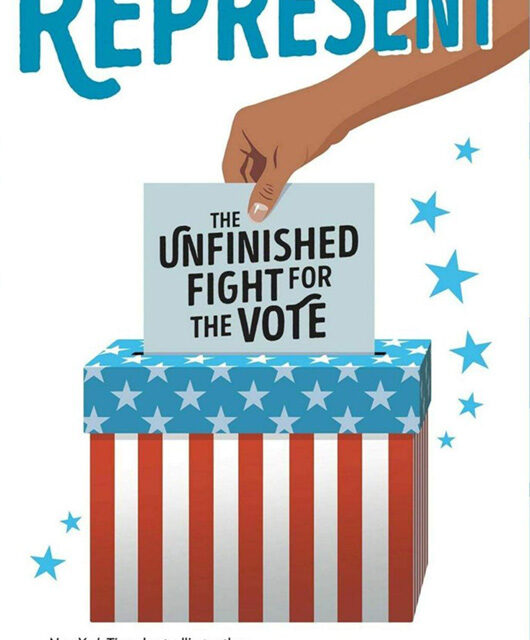
Represent: The Unfinished Fight for the Vote by Michael Eric Dyson and Marc Favreau; Little, Brown 2024, 240 pages, $19.99.
On the eve of a national election in the United States that will certainly feature angry conflicting stories of voting fraud, an extra relevance attaches to Represent, the new collaboration by Michael Eric Dyson and Marc Favreau.
This new book centers on the struggle throughout American history to extend voting rights, the “people power” that had originally been held only by a minority of the new country’s white male landowners.
The story begins as the country begins, but the real inciting decade was the 1820s, which saw not only the steady growth of the power of the slave states but also the rise to national political prominence of slave owner and future President Andrew Jackson. By 1840, the year of the World Anti-Slavery Convention in London, some of the book’s most vividly-drawn crusaders for civil rights are beginning to reach prominence.
One of these, the great 19th-century African American abolitionist and Underground Railroad “conductor” Robert Purvis (referred to here as a “veteran people-power advocate”), wrote a stirring book on the subject of electoral equality.
“When you have taken from his individual his right to vote,” he wrote, “you have made the government… a mere despotism.”
Mr. Dyson and Mr. Favreau’s characterization of such major figures as Elizabeth Cady Stanton and Sojourner Truth are equally dramatic, impressing on readers that the early suffragists took very real risks.
“Of all the things out of reach for women, voting was the furthest,” the authors write. “America had become a nation where voting was almost always limited to white men — a so-called democracy where people power was held by a numerical minority of the population that jealously guarded that power.”
In previous decades just as it is today, struggles against the oppression of that minority in power created new alliances.
“Together, Black and white women, despite many differences, united into a single force,” the authors write. “And when the war against slavery was won, this new generation of women activists, Black and white, had no intention of retreating to the sidelines.”
This refusal of groups and brave individuals to retreat to the sidelines is the bright line running through all the profiles Mr. Dyson and Mr. Favreau create, all lightly and readably drawn. The authors included a selection of ideas for modern-day activism, everything from Get Out the Vote initiatives to eliminating the Electoral College, but the people are the highlights of the book.
The authors follow their story of courageous activism well into the 20th century, focusing at one point in the 1970s on voting advocate Willie Velasquez of San Antonio Southwest Voter Registration Education Project.
“By registering hundreds of thousands of new voters,” readers are told, “he would do something no one had ever attempted: build Latino political power in the United States.”
Velasquez’s motto, “Su voto es su voz” (your vote is your voice) might well double as the clarion call of the entire book.
At one point in their narrative, the authors note that Andrew Jackson’s landslide 1828 victory in the U.S. Presidential election was a triumph for white men and earned him a place on the $20 bill, even though he owned slaves and actively engaged in genocidal measures against Native Americans.
“Is it possible,” they ask, “that like many Americans [in Jackson’s time] we still have our own blind spots about democracy in America?”
Some possible answers to this question might come to mind — in 2024, for instance, we extend no meaningful legal protections, much less a franchise, to non-human animals or artificial intelligences, or to young people in their early teens. But Represent gives a good deal of hope along all such lines. It describes a flawed, fumbling process that’s nevertheless always struggling to build a more perfect union. The only real threat to such a process is an autocracy that actively hates “people power.”
All eyes turn to Election Day.


